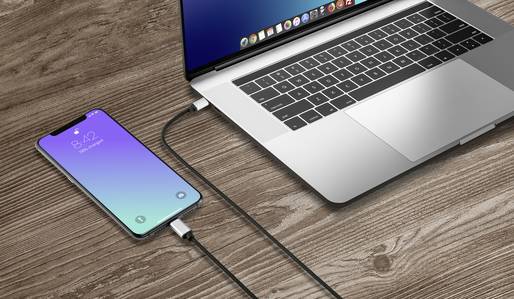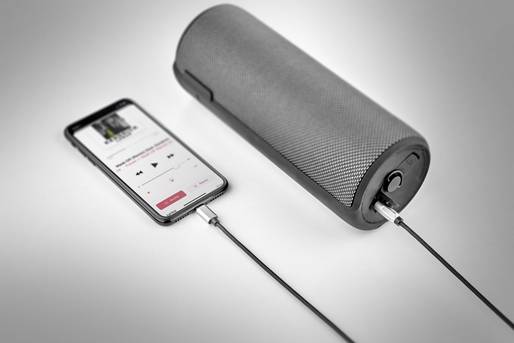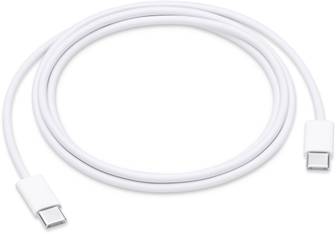Apple MFi » Certified cables and adapters for iPhone & Co.
Published: June 7, 2023 | Reading time: 6 minutes
This text is machine translated.
The corresponding MFI logo identifies Lightning and HomeKit accessories that are fully compatible with Apple mobile devices. This means that the product has been tested and approved by Apple and found to be safe and compatible with your iPhone, iPad, or iPod. The result is complete charging and synchronization compatibility with Apple devices.
In our guide, you can find out what MFi certification is all about, what advantages it offers you as a commercial or private user, and which products are MFi-certified.
iPhones and iPads with damaged charging electronics are not uncommon – and repairing the devices is complex and correspondingly expensive. The defect is usually caused by an unsuitable Lightning cable and/or an unregulated power adapter that supplies too much voltage when charging Apple devices, thereby damaging the sensitive hardware.
Another problem for users of Apple mobile devices is iPhone charging cables and chargers that do not work as described because the manufacturers have cut corners on the materials used, workmanship, or quality assurance.
To prevent this, Apple has launched the Made for iPhone certification program. The aim is to combat product copies that are of inferior quality and therefore potentially dangerous. The company with the apple logo points out that non-certified products may not perform as required and may even damage devices.
Apple's MFi certification is a seal of quality for Lightning cables and other products that are compatible with Apple devices such as the iPhone and iPad.
To obtain this certification, products must pass a test conducted by Apple that checks the safety and performance of the components. Products with Apple MFi certification have a special authentication chip that is recognized by Apple devices.
The company aims to ensure optimal user-friendliness and interoperability. The products are tested by Apple technicians themselves or by a commissioned testing laboratory.
If the test is passed, the manufacturer is allowed to display the MFI logo on the packaging of the product in question and use it for advertising purposes.
You can recognize cables (Lightning to USB-A or Micro-USB), chargers, and other products with MFI certification by the MFI logo on the packaging or the product itself. The logo indicates that the product is made in accordance with Apple's quality standards for the iPhone or iPad. Also, look for a corresponding note in the product description.
The most important advantages of MFi-certified accessories at a glance:
They ensure that your Apple devices charge quickly and efficiently and transfer data efficiently.
You avoid defects caused by poorly fitting, incorrectly designed, or malfunctioning cables and chargers.
In many cases, you benefit from significantly longer service life, sustainability, and higher product quality.
Examples of MFi-certified products for the Apple ecosystem include:
-
Lightning cable with USB for charging (Qi chargers) and data transfer
-
Adapter for Lightning USB
-
Headphones and speakers with Lightning connector
-
Speakers and hi-fi devices with AirPlay audio
-
Cable for iPod (USB to iPod)
-
Cars with CarPlay
-
Game controllers and remote controls with Bluetooth or Lightning connection
-
Smart home devices such as wireless sockets, lamps, thermostats, door locks, and cameras
-
Apple Watch charger (USB)
-
Hearing aids
-
MagSafe power adapters
Our products with Apple MFi certification
In our online shop, you will find a wide selection of MFI-certified Lightning cables and accessories for the iPhone, iPad, and iPod. You can search for authorized MFI licensees on Apple's MFI portal. In the “Finding an Authorized MFI Licensee” section, click on “View MFI authorized manufacturers” or something similar. Confirm the terms of use and you will be taken to the list of MFI-certified accessories.
No, while Apple MFi is an important indicator of certified cables and other high-quality certified accessories, cables and Apple accessories without certification are not necessarily of poorer quality.
Many manufacturers of accessories for iPhone, iPad, and Apple Watch save themselves the expense of Apple certification and do not purchase an MFI license.
This allows them to offer non-certified products at lower prices, often saving buyers money.
However, this does not automatically mean that the cables, docks, battery cases, and so on are lacking in quality and compatibility with Apple products.
However, Apple has not tested these products and therefore does not guarantee their long-term compatibility with iPhones or iPads.
Since devices without the Made for iPhone logo also lack the MFI chip manufactured exclusively by Apple, the company can identify non-certified accessories at any time and either exclude them entirely or restrict certain functions due to possible or proven incompatibility. In plain language, this means that iPhone and iPad accessories that have not been approved by Apple may suddenly stop working.
Possible restrictions on Lightning cables without an authentication chip include reduced data transfer or battery charging at reduced power. Apple may also make the activation of certain functions in the iOS, iPadOS, and WatchOS operating systems or in conjunction with Windows and MacOS dependent on the MFI chip. So if you want to avoid any nasty surprises later on, it's better to choose a certified product.
Apple's requirements for accessory manufacturers are very extensive. The required product characteristics include specifications for connectors, material selection, dimensions, plugs, insulation, kink protection, resistors, transmission characteristics, and thermal properties. Details can be found in the Apple Accessory Design Guidelines for Apple Devices and the Safety Guide for Apple Platforms.
In addition to iPads with the classic Lightning connector, Apple now offers newer iPads with USB-C. The switch to USB-C has therefore been successful for the iPad. So far, Apple has not certified the corresponding cables.
The EU directive for standardised chargers is forcing Apple to use USB-C ports on iPhones as well. European Union regulations require Apple to switch new iOS devices to USB ports instead of the proprietary Lightning standard and USB-C for charging cables. Apple has the technical capability to certify certain functions of USB-C cables for the iPhone. This would allow fully assembled cables with USB-C to be used, for example to charge the iPhone or transfer data, but only USB-C cables certified by Apple would deliver full performance. However, representatives of the EU Commission consider possible restrictions on cables with USB-C in conjunction with chargers to be inadmissible.
Critics accuse Apple of using the MFI standard to push users into buying expensive cables with Lightning connectors and other accessories, and of wanting to control accessory manufacturers. The background to this is that the company earns money from certified accessories for Apple Lightning, as manufacturers have to pay license fees for the Lightning connector with MFi. This is supposed to make the products more expensive. In addition, the company can decide which manufacturers receive MFI certification and which do not. Critics also complain that Apple offers original cables and other accessories without the MFI seal, such as for iPads with USB-C ports.



